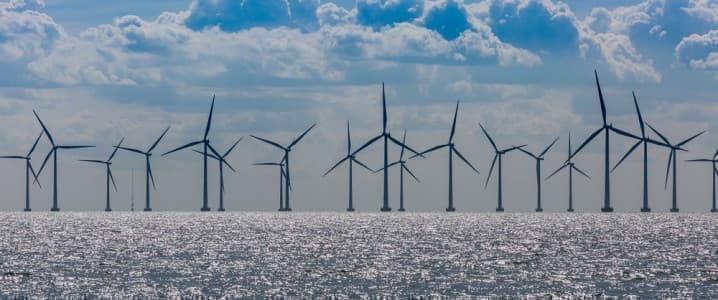After the most recent U.K. offshore wind auction failed to attract a single bid, the outlook for British wind energy looks increasingly bleak. In recent months, the U.K.’s conservative government has made its backing for oil and gas projects in the North Sea clear, potentially to the detriment of the country’s green transition. The U.K. relies heavily on wind power, which provides over a quarter of its electricity, and the recent auction presents yet another blow to the country’s green ambitions.
This September saw a record number of renewable energy capacity projects awarded with government funding in the U.K.’s biggest clean energy auction. Contracts were awarded for a total of 3.7 GW of solar power, onshore wind, and tidal power projects. However, there were no bids at all for offshore wind, putting a halt to the U.K.’s ambitious plans for the sector. This has been termed the biggest clean energy disaster in years by some energy experts. Yet, the government largely dismissed the failure, stating “While offshore and floating offshore wind do not feature in this year’s allocation, this is in line with similar results in countries including Germany and Spain, as a result of the global rise in inflation and the impact on supply chains which presented challenges for projects participating in this round.” But it has left many wondering what exactly the government intends to do to increase the U.K.’s offshore wind capacity to make the most of its natural resources and support a green transition.
Over the last two decades, the U.K. has significantly increased its renewable energy capacity. In 2000, renewables accounted for 2.8 percent of electricity generated, a figure that rose to 40 percent in 2022. And the country’s gradual transition to green has relied heavily on wind energy, which was the second largest source of electricity in 2022 after gas, at 26.8 percent. Solar power, meanwhile, provided 4.4 percent of electricity generation.
The U.K. hopes to achieve 50 GW of offshore wind capacity and 5 GW of floating offshore wind by the end of the decade, a significant increase from 14 GW at present. Around 5 GW of offshore wind was eligible to compete in the recent auction, enough to power 8 million homes a year. However, the industry body RenewableUK explained, “offshore wind projects did not bid into the auction as a result of the maximum price being set too low.” The organisation’s CEO Dan McGrail stated “Industry has warned that rising costs should have been properly priced into this auction. If the UK isn’t offering prices that allow investors to make a return, they will simply invest elsewhere.”
In addition to the recent auction fiasco, the Swedish company Vattenfall announced in July that it was halting the development of its 1.4-GW Norfolk Boreas wind power project. It cited rising costs and difficult market conditions as the reason for its decision. The wind industry has experienced cost increases of up to 40 percent according to the company, making many players set their sights on options in more competitive markets.
The government is under scrutiny from energy experts and climate activists for their failure to raise the auction price for offshore wind to make it more competitive. The cost of offshore wind has fallen since the government’s first auction in 2015 when offshore wind farms had a guaranteed price of £155 per MWh in 2012 money. In the 2022 auction, this fell to £37.50 per MWh. And this year the starting price was £44 per MWh, which turned out to be too low under current cost pressures.
One source suggested that the government far underestimated the cost increases faced by wind energy companies. Government officials believed companies were “crying wolf” to encourage higher auction prices. The source stated, “The problem with that if you remember the fairytale, is that there really was a wolf in the end. The government officials now have their wolf.”
There is now significant pressure for the government to change the auction rules in the future to ensure this cannot happen again. RenewableUK also believes the government must improve the investment framework, with a reform of the contracts and greater support for struggling supply chains. It also hopes the government will introduce other “fiscal measures”, following in the footsteps of the U.S., to attract higher levels of clean energy investment.
So far, the government has said it will work with industry to go into the next auction in a better position. Although it has yet to suggest the introduction of any new policies. The energy consultancy Aurora estimates that achieving 50 GW by 2030 will require the government to achieve 10 GW of offshore wind capacity over the next two auctions, which will not be easy. The CEO of one big developer stated, “Stopping and waiting for 12 months is not easy. You’ve got £400m of capital in the balance on one of these big projects and you’re trying to go back through the supply chain and renegotiate contracts and shift delivery slots.” It was doable, he said, but another flop really would bring the offshore show to a halt.
After the massive offshore wind failure this month, the government must show the U.K., and the rest of the world, that it remains committed to a green transition, led by wind energy. It must now work with industry leaders to better understand the offshore wind environment and introduce favourable policies if it hopes to meet its ambitious wind targets by the end of the decade.
By Felicity Bradstock for Oilprice.com
More Top Reads From Oilprice.com:
- UK Infrastructure Investment Is Falling Behind
- Oil Prices Extend Gains As Market Tightens
- ChatGPT's Surprising Environmental Footprint Revealed


















